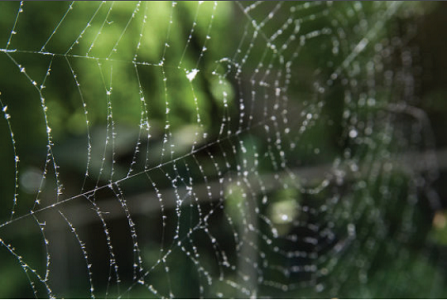Vật liệu mới làm từ tơ nhện và gỗ có thể thay thế nhựa
Đạt được cả khả năng chịu lực và độ đàn hồi là một thách thức lớn trong kỹ thuật vật liệu, bởi tăng sức mạnh nghĩa là giảm bớt độ mềm dẻo và ngược lại. Trong một công bố mới đây trên Tạp chí Science Advances, lấy cảm hứng từ thiên nhiên, các nhà khoa học đến từ Đại học Aalto (Phần Lan) đã thành công trong việc vượt qua thử thách nêu trên, tạo ra một vật liệu mới kết hợp giữa tơ nhện và bột gỗ, có những tính năng tương tự như nhựa, nhưng lại có khả năng phân hủy sinh học nên hoàn toàn thân thiện với môi trường.
Theo báo cáo của Liên hợp quốc, mỗi năm trên toàn thế giới sử dụng khoảng 500 tỷ chai nhựa, hơn 500 tỷ túi nilông. Lượng rác thải nhựa hiện nay đã đủ để phủ kín bốn lần diện tích bề mặt Trái đất, trong đó có khoảng 13 triệu tấn đã thải trực tiếp ra các đại dương.
Theo một báo cáo tại Hội nghị Davos (Thụy Sỹ, năm 2019) ước tính đến năm 2050 lượng rác thải nhựa dưới biển sẽ nhiều hơn cá (tính theo trọng lượng); và phải mất hàng trăm, thậm chí hàng ngàn năm, các chất thải từ nhựa và nilông mới bị phân hủy.
Để giải quyết vấn nạn nêu trên cần sự vào cuộc của các nhà khoa học để sớm tìm ra giải pháp thay thế nhựa. Tuy nhiên, công tác nghiên cứu nhằm tìm ra vật liệu thay thế nhựa, đáp ứng hiệu quả yêu cầu của ngành công nghiệp sản xuất bao bì đang gặp rất nhiều khó khăn, do phải đáp ứng nhiều tiêu chuẩn khắt khe trong các ngành khác nhau. Trở ngại lớn nhất là các vật liệu mới quá giòn so với sự mềm dẻo, tiện dụng của các sản phẩm từ nhựa.
Cùng trong nỗ lực nêu trên, một tia hy vọng mới hứa hẹn nhiều tiềm năng đã được Pezhman Mohammadi và các cộng sự công bố trên Tạp chí Science Advances vào tháng 9/2019. Các nhà khoa học đến từ Đại học Aalto (Phần Lan) cho biết đã tìm ra phương pháp chế tạo một loại vật liệu có độ bền và khả năng đàn hồi tương đương với nhựa, nhưng lại có thể phân hủy sinh học nên hoàn toàn thân thiện với môi trường.
Trong nghiên cứu của mình, Pezhman Mohammadi và các cộng sự đã kết hợp 2 nguyên liệu sinh học đầy triển vọng là protein tái tổ hợp tương tự tơ nhện (spidroin) và nano cellulose để tạo ra nano composite với độ bền, độ cứng, cũng như khả năng đàn hồi cao.
Cho đến nay, tơ nhện vẫn được tôn vinh là “đũa thần của khoa học vật liệu” khi bàn đến một loại nguyên liệu có tính đàn hồi cao trong tự nhiên, bởi nó nhẹ, thân thiện với môi trường và siêu bền, thậm chí những tính năng nổi trội của thép cũng bị lu mờ trước nguyên liệu này.

Ảnh minh họa
Nano cellulose là cellulose đã được thu nhỏ và tái cấu trúc ở cấp độ nano. Cellulose - loại nguyên liệu tự nhiên phổ biến nhất trên trái đất, là thành phần chủ yếu của thành tế bào thực vật, tạo nên màu xanh cho hầu hết thực vật trên Trái đất. Khi kết hợp với nước, nó trương lên, tạo thành khung xương vững chắc, giúp cây đứng vững.
Tạp chí Science Advances đã mô tả về vật liệu mới như sau: chất lượng của vật liệu tương tự như nhựa, rất chắc chắn và có khả năng đàn hồi tốt, đặc biệt là có thể phân hủy sinh học, giúp nó hoàn toàn thân thiện với môi trường, mở ra tiềm năng ứng dụng như một sự thay thế hoàn hảo cho nhựa, hay các vật liệu sinh học tổng hợp, thậm chí cả trong việc chế tạo các dụng cụ y tế, sợi phẫu thuật, trong ngành dệt may, sản xuất bao bì, hay các vật liệu tổng hợp tương tự dùng trong lĩnh vực xây dựng.
ntqnhu
Theo Tạp chí Khoa học và Công nghệ Việt Nam